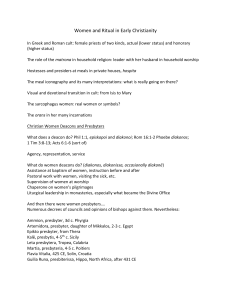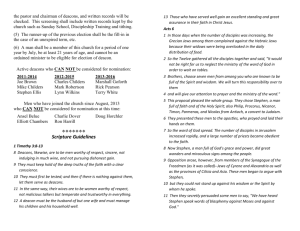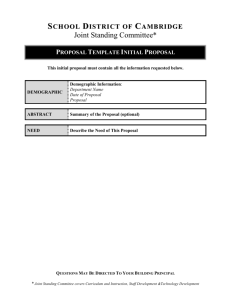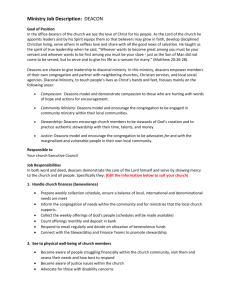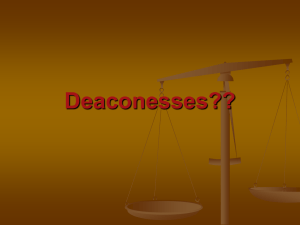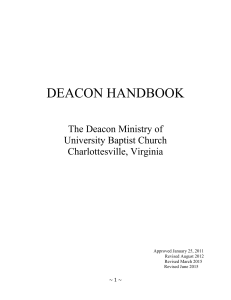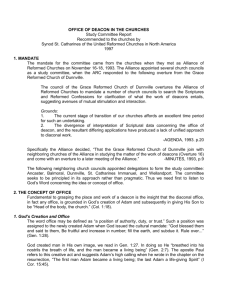immense amended
advertisement
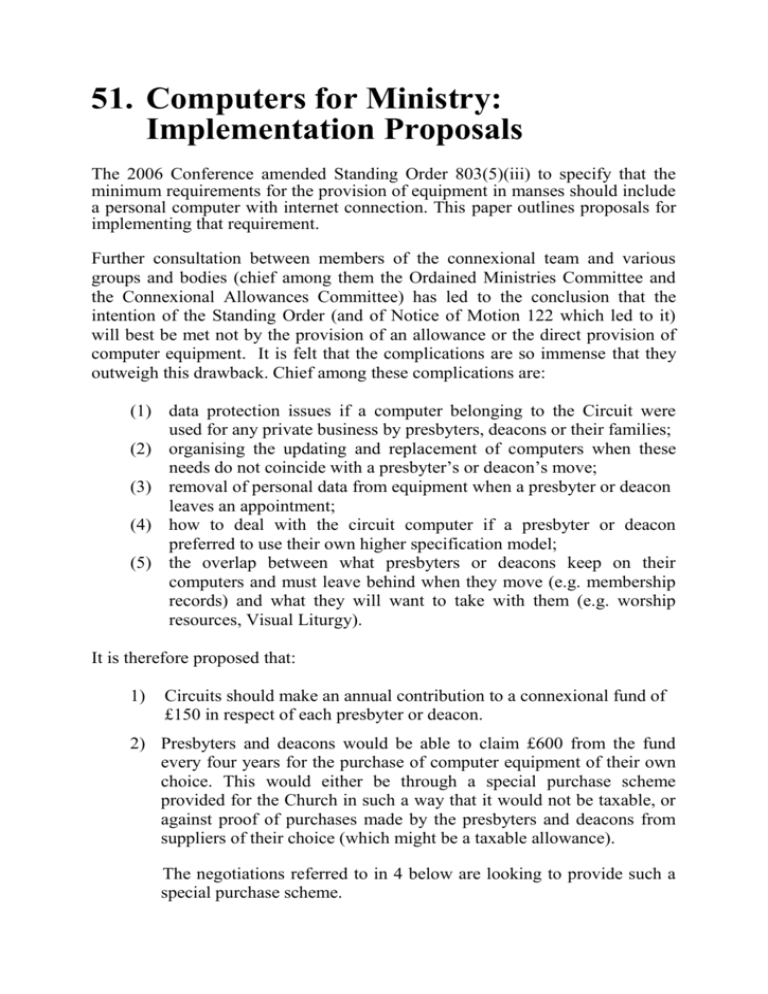
51. Computers for Ministry: Implementation Proposals The 2006 Conference amended Standing Order 803(5)(iii) to specify that the minimum requirements for the provision of equipment in manses should include a personal computer with internet connection. This paper outlines proposals for implementing that requirement. Further consultation between members of the connexional team and various groups and bodies (chief among them the Ordained Ministries Committee and the Connexional Allowances Committee) has led to the conclusion that the intention of the Standing Order (and of Notice of Motion 122 which led to it) will best be met not by the provision of an allowance or the direct provision of computer equipment. It is felt that the complications are so immense that they outweigh this drawback. Chief among these complications are: (1) data protection issues if a computer belonging to the Circuit were used for any private business by presbyters, deacons or their families; (2) organising the updating and replacement of computers when these needs do not coincide with a presbyter’s or deacon’s move; (3) removal of personal data from equipment when a presbyter or deacon leaves an appointment; (4) how to deal with the circuit computer if a presbyter or deacon preferred to use their own higher specification model; (5) the overlap between what presbyters or deacons keep on their computers and must leave behind when they move (e.g. membership records) and what they will want to take with them (e.g. worship resources, Visual Liturgy). It is therefore proposed that: 1) Circuits should make an annual contribution to a connexional fund of £150 in respect of each presbyter or deacon. 2) Presbyters and deacons would be able to claim £600 from the fund every four years for the purchase of computer equipment of their own choice. This would either be through a special purchase scheme provided for the Church in such a way that it would not be taxable, or against proof of purchases made by the presbyters and deacons from suppliers of their choice (which might be a taxable allowance). The negotiations referred to in 4 below are looking to provide such a special purchase scheme. 3) A professionally-resourced maintenance contract or warranty agreement should be either an allowable expense for presbyters or deacons or directly arranged by the circuit 4) The Connexional Team should periodically provide information about cheap-rate software (for educational/charity purposes) and about minimum level specifications for equipment; and should periodically seek to negotiate arrangements with suppliers which would provide presbyters and deacons with opportunities to purchase equipment and maintenance contracts at a discount. Negotiations are underway with a major supplier to be able to offer such an arrangement. 5) A broadband internet connection should be provided if it is available on the same terms as the provision of telephones for presbyters and deacons. Arrangements have been made with a major company to offer a discounted rate for this service. The above arrangements apply to those in the active work in an appointment within the control of the Church. The body responsible for the stipend of a presbyter/deacon in the active work in an appointment within the control of the Church is generally responsible for providing the computer. Those appointed to the Connexional Team, however, or similar bodies where those bodies provide computers and other office equipment for all their staff (lay and ordained) should be excepted from the general rules. E-mail addresses for presbyters and deacons It is proposed that all presbyters and deacons to whom the above arrangements apply, and any others (e.g. those in appointment not within the control of the Church) who wish should be provided at connexional expense with an e-mail address hosted by a provider on behalf of the connexion [e.g. X.Y@methodistchurch.org.uk or similar]. They would be able to access messages sent to this address by web-mail or by arranging for them to be forwarded to a private address of their own choice. They would be able to send messages from this address. This would therefore be their formal e-mail address that is in the public domain. The various parts of the connexion would be able to communicate with them through it where appropriate. Standing Orders The above proposals fall under Standing Order 801(2) and so no additional Standing Orders are required to effect them. This in turn means that the relevant reference in Standing Order 803(5)(iii) is no longer appropriate. Changes to Standing Orders are proposed in the Resolution below to effect this.’ ***RESOLUTION 51/1. The Conference adopts the Report and amends Standing Order 803(5)(iii) by deleting “personal computer with internet connection”
